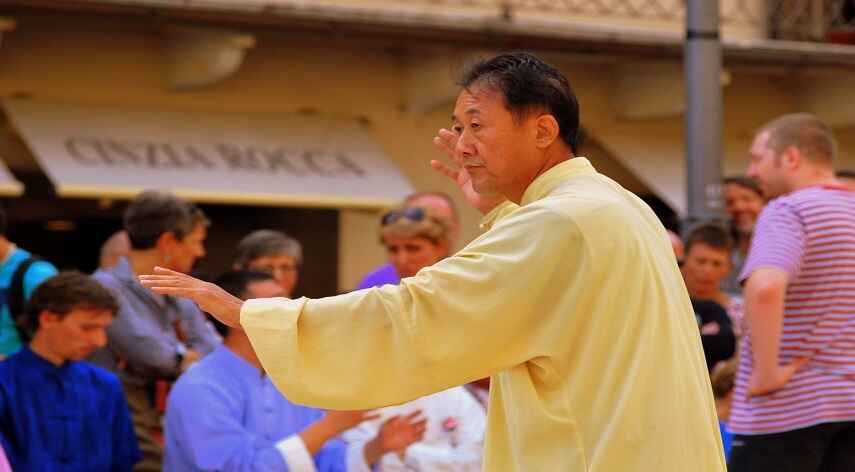Qi Gong vs Tai Chi: Which Practice has a Greater Impact on Health and Wellness?

Hey there, wellness warriors! If you’re diving into the world of ancient practices to boost your health and well-being, you’ve likely stumbled upon the mystical realms of Qi Gong and Tai Chi.
These two mind-body exercises have been around for centuries, promising a plethora of benefits. But, which one should you pick?
Fear not! We’re about to unravel the secrets behind Qi Gong vs Tai Chi, helping you decide which practice might be your health and wellness superhero. Read on!
Table of Contents
ToggleUnderstanding Qi Gong
Let’s kick off with Qi Gong. Imagine it as a slow dance with energy. Qi Gong, rooted in traditional Chinese medicine, is all about cultivating and balancing the body’s vital life force, or “qi.”
It involves gentle movements, deep breathing, and a sprinkle of meditation. The goal? To promote the smooth flow of energy throughout your body, banishing stress, and inviting a sense of calm.
Tai Chi Unveiled
Now, onto Tai Chi, the graceful cousin of Qi Gong. Picture it as a martial arts master in a slow-motion showdown.
Tai Chi incorporates a series of flowing movements, known as forms, seamlessly connected like a choreographed dance. Originally developed as a martial art, Tai Chi has evolved into a powerful tool for cultivating balance, flexibility, and focus. It’s like a moving meditation that strengthens both body and mind.
Qi Gong Wellness Wonders
Let’s talk about what these practices can do for your body. With Qi Gong, you’re in for a treat. This practice is like a spa day for your muscles and joints.
Regular sessions can improve balance, flexibility, and coordination. Plus, it’s a gentle way to tone those muscles without breaking a sweat. Think of it as a low-impact exercise that’s easy on the joints but still packs a punch for overall physical well-being.
Tai Chi for Flexibility and Strength
Now, Tai Chi steps into the ring, offering a holistic approach to physical health. Engaging in Tai Chi regularly can enhance your flexibility, strengthen your muscles, and improve your posture.
It’s not just about the external benefits, though. Tai Chi’s deliberate movements promote internal harmony, supporting your organs and boosting overall vitality. So, if you’re seeking a practice that flexes both your physical and internal muscles, Tai Chi might be your go-to.
The Qi Gong Mind-Body Connection
Let’s dive into the mental realm. Qi Gong is like a mental reset button. The combination of slow movements and focused breathing helps reduce stress and anxiety.
It’s like pressing pause on life’s chaos and finding a serene oasis. With regular Qi Gong sessions, you can enjoy an enhanced mentality, improve your mood, and cultivate a sense of inner peace.
The Tai Chi Mind Tranquility
Tai Chi doesn’t just stop at physical prowess; it’s a true Jedi for your mind. The deliberate and mindful nature of Tai Chi forms acts like a meditation in motion.
It helps quiet the mental chatter, reduces stress, and boosts cognitive function. If you’re on a quest for mental tranquility and mindful workouts, Tai Chi might be your Jedi training ground.
Qi Gong vs Tai Chi – Choosing Your Path to Wellness
So, in the epic showdown of Qi Gong vs Tai Chi, who emerges as the ultimate champion? The truth is, both practices are powerful tools on the journey to health and wellness.
Qi Gong with its gentle, energy-focused approach, and Tai Chi with its graceful, flowing movements, offer unique benefits. The choice ultimately comes down to your preferences and what resonates with you. Find joy and balance in your wellness adventure!
Did you like this guide? Great! Browse our website for more tips!
Mike Farrier possesses over 18 years of hands-on experience in software and web development, SEO, social media marketing, eCommerce, and digital marketing. He has been active in the online domain since 2019, serving as a seasoned SEO and digital marketing consultant.
Recommended For You
Spread the loveSexual health is an essential aspect of personal well-being. If you’re based in London and need STI testing,
Spread the loveIn today’s fast-paced world, managing your health effectively is more important than ever – especially for those of
Spread the loveThe EGFR blood test is an important way to check how well the kidneys are working. It checks



